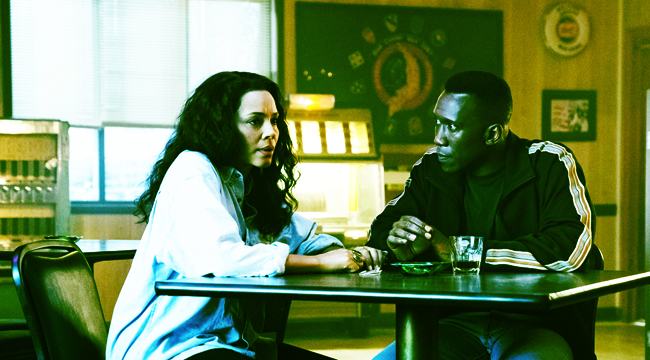
The third season of True Detective is in the books. There were twists and turns and red herrings. There were broken relationships that got fixed through time and confessions. There were more dogs and hugs than I expected, to be honest. This last one is not a complaint. None of them are, really. There are quibbles to be made if you’re a quibbler, and we’ll get to those in a bit, but for the most part, the season rode on the backs of strong performances and a plot that went about 50 degrees to the left of where we thought it was going to go, and it all pretty much worked for me. You don’t expect a happy ending on a show about murdered and missing children, and this one wasn’t happy like a Disney movie is happy, but it was happier than any of us thought it was going to be, I think.
The dogs and hugs helped. At one point someone hugged a dog. I’m not too proud to admit this may have influenced my reaction to the ending. Let’s get into it, though. Here’s what we know, what we kind of know, and what we still don’t know after the season three finale.
What We Know
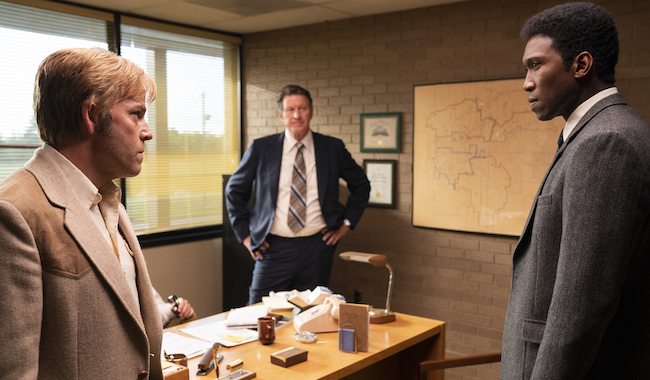
This was all much less sinister than it appeared at first
When the season started, with all of its creepy dolls and religiously-posed dead children and menacing shots of mean teens staring at children riding their bicycles in slow-motion, it sure felt like we were headed down an evil path. There was little to disabuse us of that notion as we went along. We saw powerful people try to stop the investigation cold two different times, and we saw planted evidence, and we saw people who got close to the answer end up dead in some remote area. But in the end, instead of Will Purcell’s murder and Julie Purcell’s disappearance leading us into a terrifying multistate maze of child abuse perpetrated by the wealthy and powerful, the truth was all far more sad than sinister.
The answer, in short: Isabel Hoyt, heir to the Hoyt family chicken empire, lost her husband and daughter in a car accident and fell into a deep depression. She spotted young Julie at a Hoyt employee picnic and became fixated on how much she looked like her deceased daughter, Mary. Junius “Mr. June” Watts, caretaker of the Hoyt home and of Isabel once her father gave up and started going on safari a lot, set things up with Lucy so Julie could play with Isabel in the woods. Isabel stopped taking her meds after a while, tried to run off with Julie, and accidentally caused Will to hit his head on the rock that killed him. Harris James and Junius Watts made it so that Isabel could keep Julie in secret (thanks to a hefty payout to Lucy), and everything seemed fine (er, fine-ish) until Junius discovered Isabel had been giving Julie massive doses of lithium and filling her head with lies. He helped her escape but never found her afterward.
So yeah, very sad. Heartbreaking, even, on about three or four different levels. But if you were looking for a shootout or a twisting demonic scheme leading all the way to the top, you didn’t get it. What you got instead was an ending that was … sweet? Yeah, I’ll go with sweet. There were more hugs than I think any of us expected. There was also a really powerful message about letting things go. Wayne and Roland made up. Wayne and Henry ended on a positive note. Wayne and his daughter had a touching moment in the car. It was all a little reminiscent of season one’s relatively happy ending, with the talk of the light winning and friendships overcoming years of drama. It was satisfying and nice and not entirely something I saw coming.
About the season one thing: This season opened with a bunch of similarities to the first go-round, starting with a dead young person surrounded by creepy dolls and progressing from there. It kind of okie-doked us at the end, though. Leads that seemed damning went somewhere else — Will’s notes to his sister, for one — until the truth revealed itself. I’ll have to sit on this a bit before I decide if I liked it all more than season one, but it was definitely an improvement over season two.
Wayne left his job twice, both times for Amelia
Another mystery solved in a way I didn’t see coming. Why was Wayne busted down to a desk job in 1980? Because he wouldn’t sell out Amelia and call her article a bunch of lies and misquotes, not because he was getting too close to the truth. Why did he leave the force in 1990? Because he and Amelia needed a fresh start, a way to frame their relationship around themselves instead of the case. This is also, one presumes, why she never wrote that sequel. It was a hell of a conversation, both times, both taking place in the VFW, and both opening Wayne up a little more. The second one was even more remarkable because it took place after Wayne killed a guy, and Amelia caught him burning his suit at 3 a.m. and then watched him get in a car with Hoyt the Chicken Man. There was a lot of weight being carried there on both sides, but the gist of it all was this: Both times, Wayne chose family over pressing the case. He chose to let it go. And so did Amelia.
Dogs rule, even mangy strays that hang out outside rough biker bars where they don’t take kindly to smallish outsiders insinuating that all the ugly people in the world are the result of people like them procreating
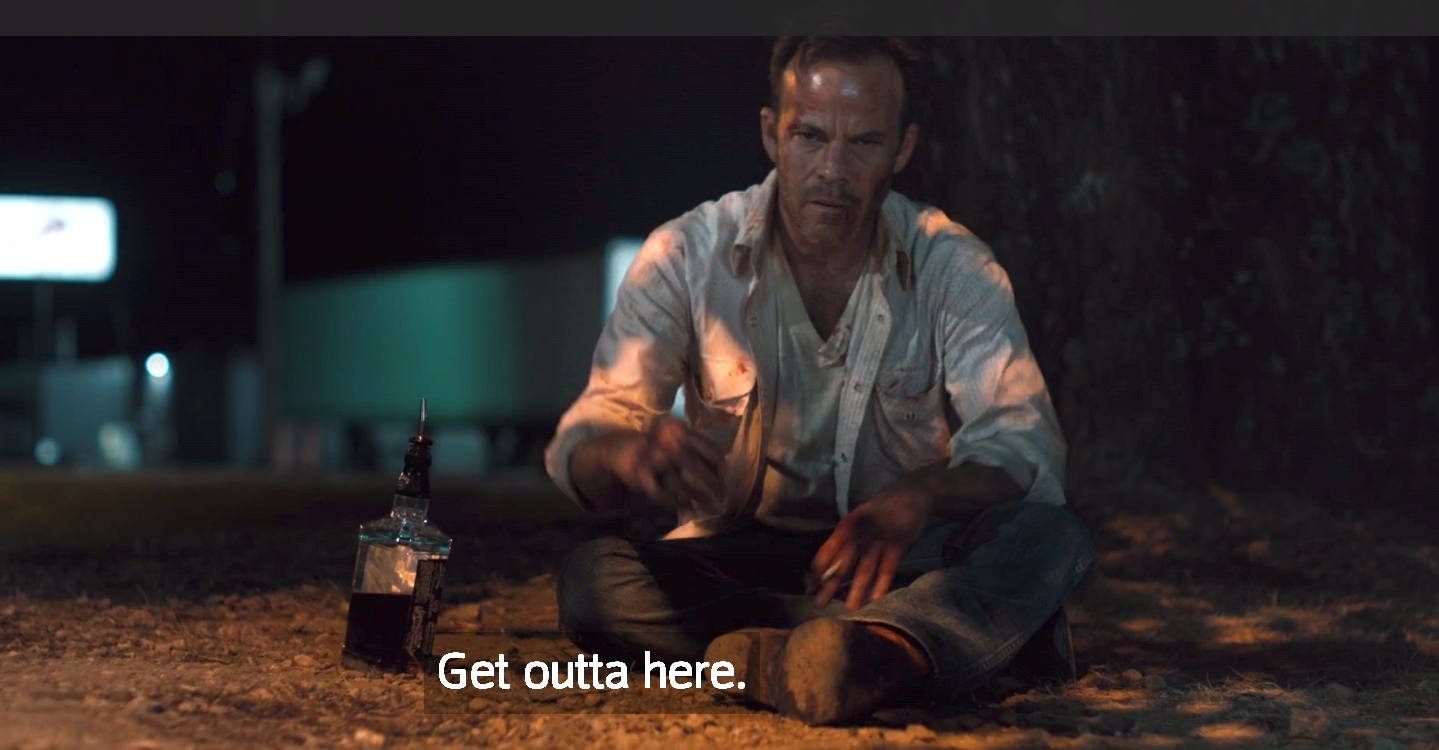
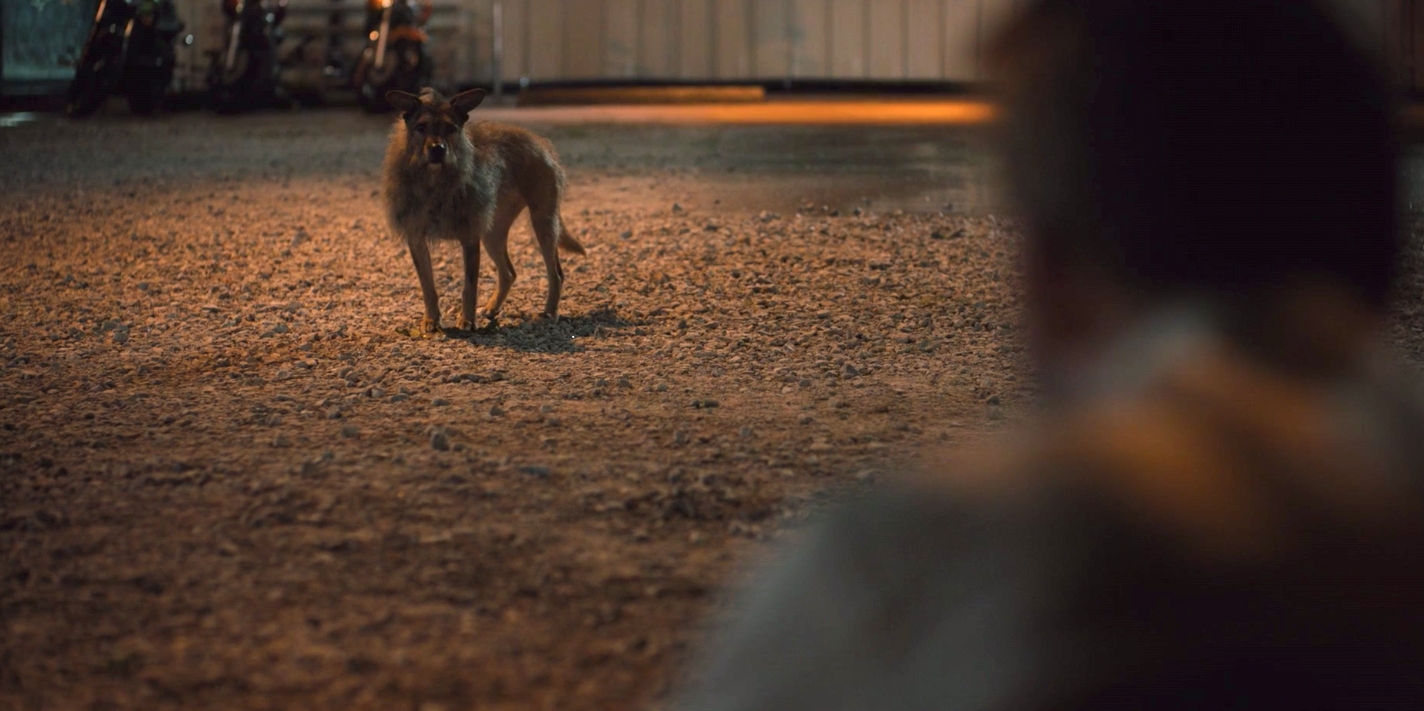
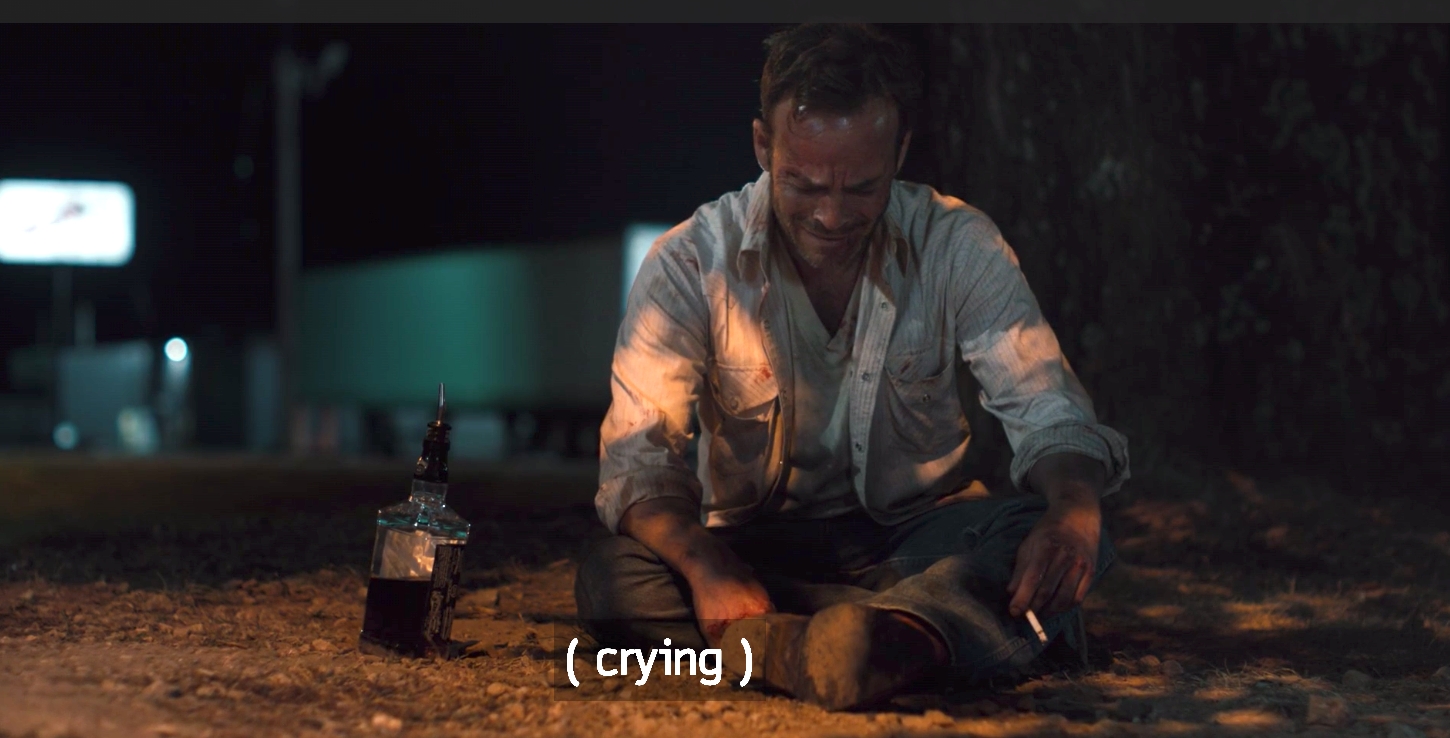
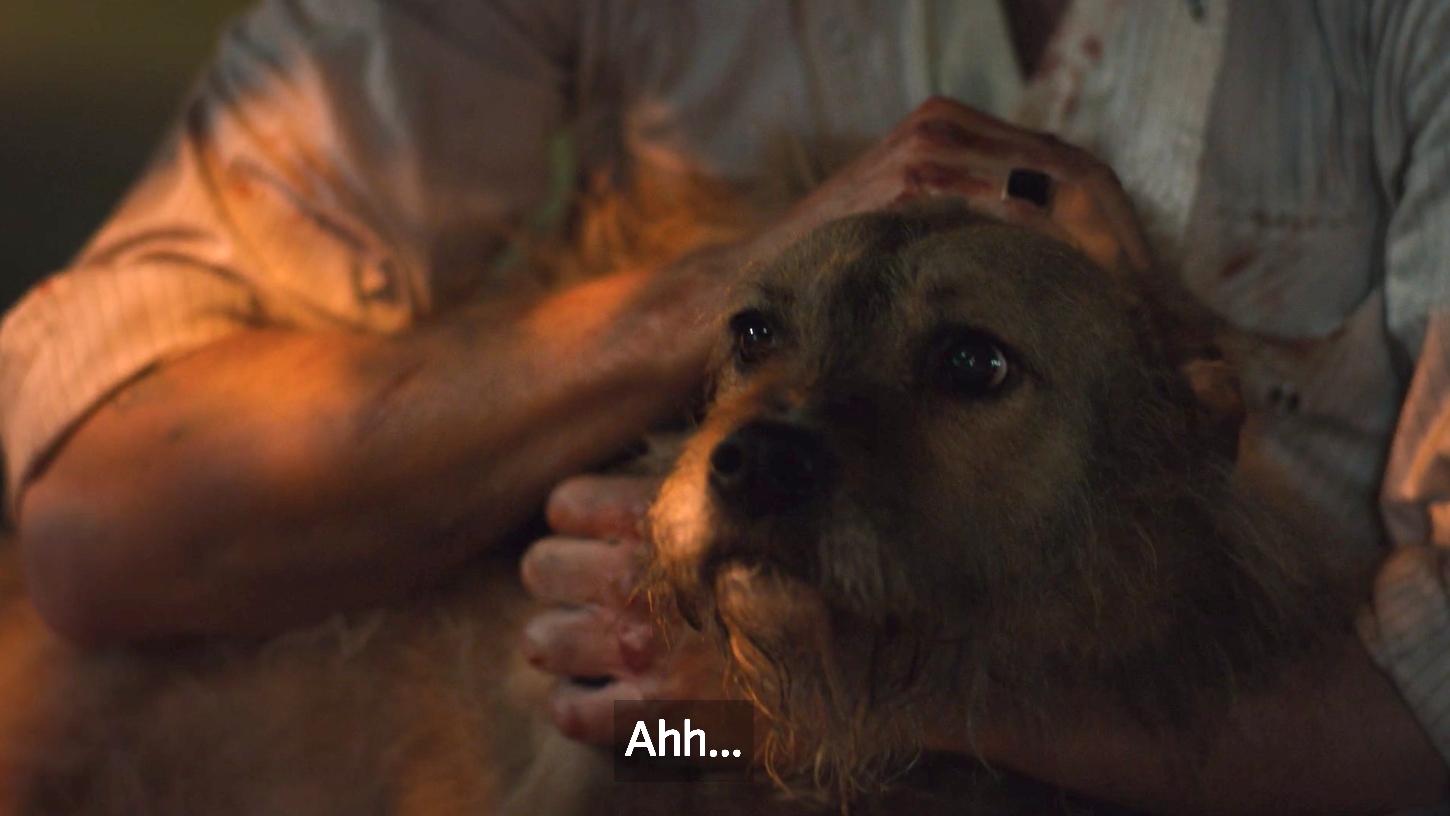
Well, here’s your answer to “How did Roland end up going from that big house in the suburbs to a borderline kennel in the woods?” Killing Harris James broke him, in part because of the actual killing and in part because of everything with Tom. He was going around picking bar fights with biker gangs to get the physical beating he felt he deserved emotionally. He was sad and dejected and drinking straight from the bottle in a bloody heap until this scraggly pup came by and showed him some love. I’m glad. I don’t think Roland took quite the right lesson from it, at least not for the first 15 years of breakfast-drinking and mean-dog-feeding, but we all get there eventually.
Mr. June sure needed to talk
Boy howdy, was that guy ever ready to spill. You can understand why, given the things he knew and the things he did and his advanced age. The whole truth of the case — or at least most of it, aside from what we already knew and what Junius didn’t — was laid out in one long monologue about two-thirds of the way through. Because my brain is a warped carnival of rewatched movies, I found myself muttering “This is just like when JK Simmons explained the whole backstory of the movie in The Accountant,” but your mileage may vary. I hope it does, for your sake.
Our time with Junius Watts ends with him shouting “Punish me!” as Wayne and Roland walk away. This is both a crueler fate for him in the long run (he has to keep living with it all, with no outside absolution), and probably a heck of a thing for a neighbor to stumble across if they had, like, just gotten home from grocery shopping or something. Think about how you’d react if your neighbor was just shouting “punish me!” at two old men who looked pissed off as they walked away from the house. I’d suddenly become very interested in the content of my grocery bags. No eye contact for me, no sir.
Stephen Dorff freaking nailed it
Man, I knew Mahershala Ali could act. The guy won an Oscar while this episode was airing, as if we needed any more proof. What I did not know was that Stephen Dorff could do … well, all of that. I don’t mean that to be dismissive of his previous work. He was always fine-to-good. But his performance in this season carried the show in some places and brought it to new heights in others. Between Ali, him, and Carmen Ejogo, the acting throughout the season was top-notch.
What We Kind Of Know
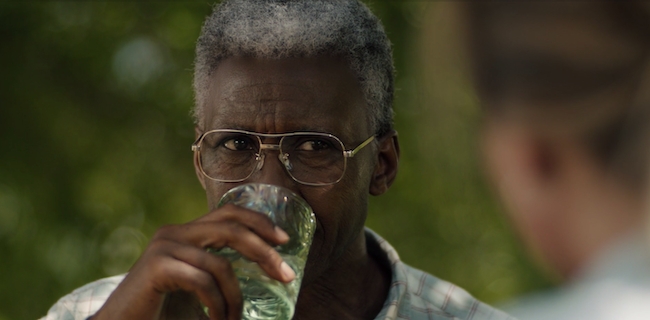
Julie is alive and living with Mike the Landscaper, unless she’s not, and Wayne just got a glass of water from some nice lady
Here’s a big pile of maybes. After the meeting with Junius Watts, after the sweet “let’s move in together, buddy” moment between Wayne and Roland, Amelia appears in another vision and suggests — after Wayne stumbles across a passage from the book he’s just now reading and proves to be full of lots of information that could have helped in, say, any year between 1990 and 2015 — that Julie didn’t actually die of rapidly progressing HIV. Maybe the nuns and Mike the Sweet Landscaping Boy conspired to get her a way out and a nice life. Maybe her ending was happy, too.
Couple things here, both related to Wayne’s brain.
The first thing is that Wayne’s mind is not entirely healthy. This vision, while very thought-provoking, was just that. A vision of his now-deceased wife. Would I very much like to believe that it was all true, a ghostly apparition providing the key to a revelation he just needed to unlock? Well, yeah. It would be nice if Julie married Mike and had a little girl she named Lucy even though the other Lucy sold her off to a troubled heiress and sent her down a path to hell-soaked impris-… sorry, got sidetracked a bit there. It would be nice, though.
The second thing: Do we think Wayne really forgot why he was out there in front of her house, or do we think he saw what he needed to see in that moment when he was sipping the water — a happy blond lady who either was Julie or was close enough to give him peace — and decided to let that go, too? I lean toward the latter. Even before he got out of the car, I was hoping he’d let it go. What purpose would it have served if he walked out like “Julie! I knew it”? It might have given him closure on a case that haunted him for 35 years, sure, but it could have undone all the nice stuff that happened to Julie after all the bad stuff happened. Selfish and not worth it. Bad.
So, I’m going to go ahead and pretend it really was Julie, and she really was happy, and Wayne realized it and decided in the moment that all of that was enough for him. I could be wrong. But this is one of those things where I’d rather be wrong and happy than right and unsettled.
The shifty DA was just a slimy opportunist, not part of a huge cover-up
There were points in this season where I was sure this guy was crooked. He still might be. Maybe he eventually got busted for taking bribes related to something else. (He seems like the type.) But regarding the Purcell case, he just wanted it solved. Or “solved.” He wanted to put it to bed as neatly and quickly as possible, and he wanted to be the guy at the microphone telling people about it. And yeah, he did end up pinning it on two innocent people in the process (poor Tom), but that was laziness and opportunism, not a part of a wide-ranging conspiracy. Hell, even Mr. Hoyt the Chicken Man didn’t really know what was going on. The two of them just turned out to be incurious powerful men who wanted things to go back to “normal” and who made crappy decisions when things didn’t. There’s a different, more systemic brand of evil in that. But at least it’s not what we thought it was.
I still think he’s dirty, though. I want him to be. It’s his face and the way he carries himself. I’d feel better if he was dirty. You know what? I’m just going to pretend he ended up disgraced and in jail. Same thing as before: happy and wrong over unsettled and right.
What We Don’t Know
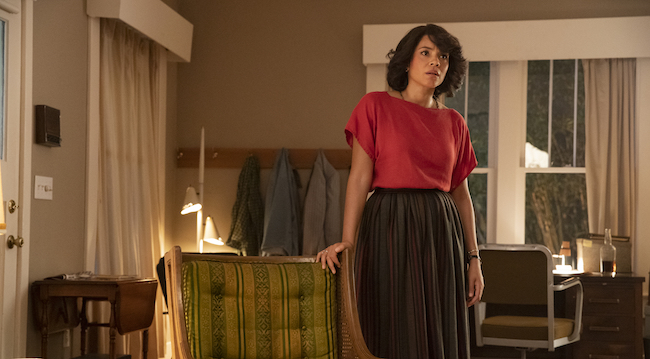
What Henry is going to do with that note
Here’s the thing that pokes a tiny hole in my “Wayne realized everything and decided to let it go” theory. If that’s true, why even give Henry the address? And what is Henry going to do with it, now that he un-crunched it and put it back in his pocket? Don’t you mess this up, Henry. Do you hear me? Don’t mess this up. And especially don’t go flapping your mouth to the blond documentary lady. That’s the last thing Possibly Julie needs right now, a damn camera crew and a conspiracy-crazed filmmaker all in her business. Ooo, I’m mad just thinking about it. Throw it away, Henry! It’s trash! Throw it in the trash!
What happened to Amelia, Cousin Dan, etc.
We don’t know and we’re never gonna know and that’s fine. Judging by the short scene of Amelia back teaching and the shot of Wayne waking up alone on his half of the bed, the bet here seems to be that they made up and lived a reasonably happy life before she passed away from normal, non-murdery circumstances. That’s good. We’ll take that.
Cousin Dan … well, either Tom or Harris put him in a quarry. We don’t know who or how, but we have a good idea on the why. Although, now that I think about it, he was such a messy scoundrel that maybe someone totally unrelated to the Purcell case killed him. Like, maybe he owed some bad dudes $500 and they walked into the hotel right after Tom left. We can’t rule it out, you know?
What happened to the documentary?
It’ll probably end up on a Netflix-like streaming service and be wildly incorrect but people will get all hopped up about it anyway. It’ll be a whole thing. I hope she interviews Rust and Marty for it, too. Especially Rust. Get my man a Lone Star tall boy and a pack of smokes, and he’ll tell you whatever you need to know.






